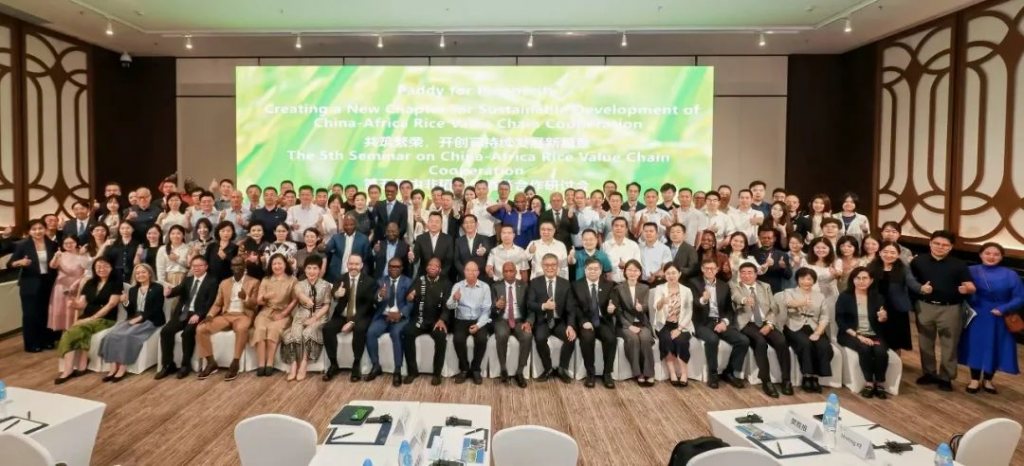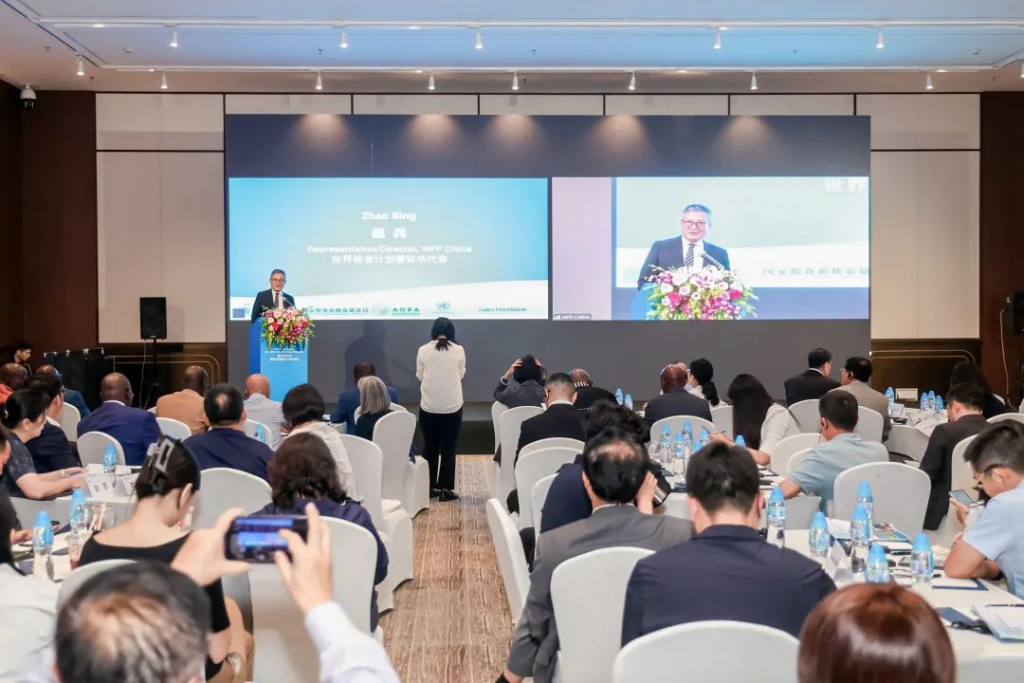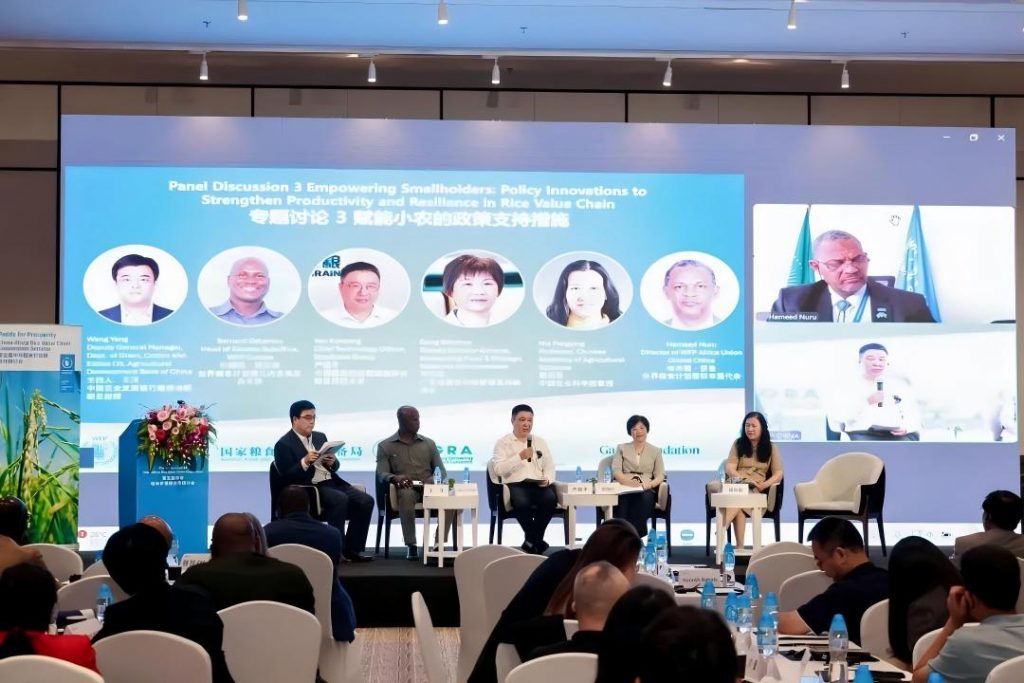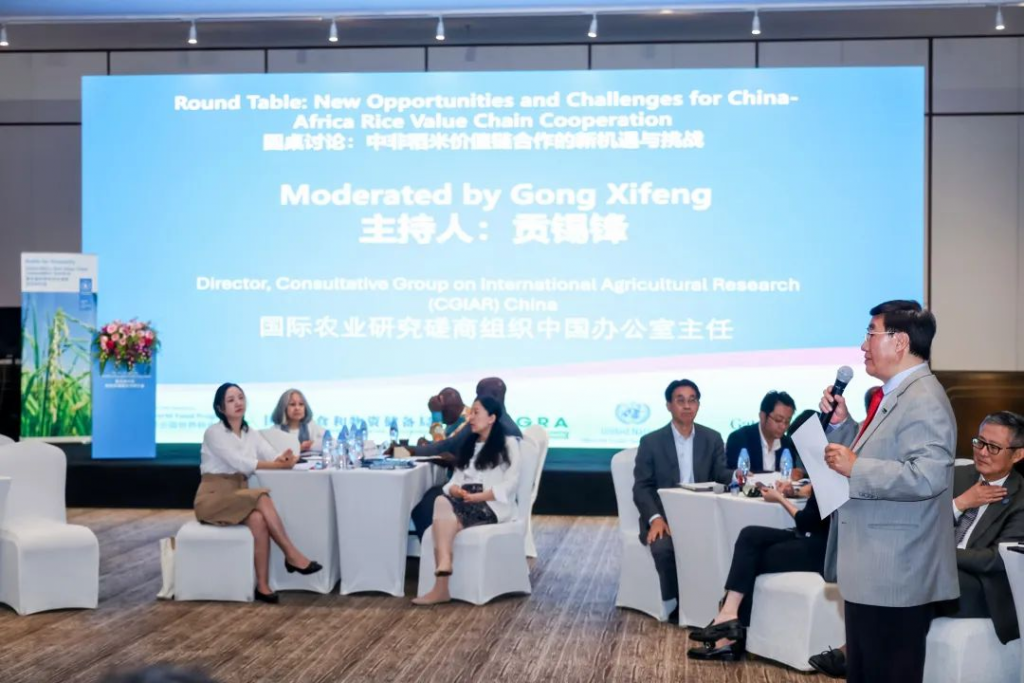Against the backdrop of a severe and complex global food security situation, the Fifth Seminar on China-Africa Rice Value Chain Cooperation, alongside the West Africa Rice Value Chain Project Review Conference concluded successfully in Guangzhou from June 17 to 19. The event was co-organized by the World Food Programme (WFP) Centre of Excellence for Rural Transformation in China, United Nations Office for South-South Cooperation (UNOSSC), the Bill & Melinda Gates Foundation, the Alliance for a Green Revolution in Africa (AGRA), and the Department of International Cooperation of the National Food and Strategic Reserves Administration (NAFRA) of China. Over 150 representatives from government departments, embassies in China, international organizations, research institutions, enterprises, and social groups gathered to discuss cooperation pathways for China-Africa food system transformation and sustainable agricultural development under the theme "Paddy for Prosperity: Creating a New Chapter for Sustainable Development of China-Africa Rice Value Chain Cooperation". The event systematically reviewed the practical achievements of the West Africa Rice Value Chain Project, emphasizing the role of technology localization and multilateral cooperation mechanisms in driving Africa's food system transformation.

At the seminar, participants from various countries actively contributed suggestions on optimizing policy environments, exploring investment opportunities, and fostering innovative cooperation. Key discussions focused on leveraging technological innovation and localized technology applications to enhance rice production and strengthen agricultural climate resilience. Participants also emphasized the need for integrated rice value chain development—from processing, storage, and logistics to market branding—to systematically upgrade the industry and improve smallholder farmers' income levels. Concurrently, the seminar explored pathways such as building local technical talent pools, promoting the integrated development of smart agriculture and green low-carbon agriculture, and establishing long-term investment and financing systems and policy support frameworks through South-South cooperation mechanisms and multilateral partnerships. These efforts aim to advance China-Africa agricultural sustainability and co-build a more resilient global food system. In his opening remarks, Dr. Zhao Bing, representative and country director of the World Food Programme (WFP) China Office, noted that Africa's rice output has doubled over the past decade, demonstrating positive growth. However, he highlighted persistent challenges: rising population and consumption demands, climate change, and underdeveloped industrial systems, which keep many African nations reliant on imports to meet rice supply gaps. "Food security is pivotal to national governance, social stability, and economic prosperity. Developing the rice value chain is a critical breakthrough point for transforming food systems."

Mr. Zhao Bing further stated that currently 757 million people worldwide still face food insecurity, with approximately one-fifth of Africa's population suffering from chronic food shortages. This reality highlights both immense challenges and vast opportunities for cooperation. "Africa possesses 60% of the world's undeveloped arable land, along with a young and dynamic population, offering tremendous development potential. Yet, Africa's rice yield per unit area remains below the global average. Unlocking agricultural potential and enhancing food self-sufficiency are shared responsibilities we must shoulder." He recalled a visit to Guinea last year, where a farmer told him: "With a better harvest, my children can attend school, and my community will thrive." Mr. Zhao called on all parties to provide inclusive and sustainable solutions that respond to people's aspirations, jointly transforming rice fields into pathways to prosperity.
Mr. Zhao Bing expressed sincere gratitude to all stakeholders for their contributions. He stated that since its launch in late 2022, the achievements of the West Africa Rice Value Chain Project embody collective wisdom and dedication. Moving forward, the project will further promote the localized application of Chinese agricultural technologies in Africa, expand the dissemination of successful practices, and tangibly enhance agricultural resilience and long-term food security capacity across the continent.


Demonstrating Project Outcomes, Highlighting Collaborative Impact
With generous funding from the Bill & Melinda Gates Foundation, the West Africa Rice Value Chain project has taken root in 10 communities across Côte d'Ivoire and Guinea, directly benefiting over 2,000 farming households. Evaluation findings showed that the introduction of improved seeds, fertilizers, and small agricultural tools led to a 20-40% increase in rice yields. Post-harvest losses dropped from 30% to 15%, while farmer incomes rose by around 30%.
The project also demonstrated significant gains in promoting gender equality. In Côte d’Ivoire, 98% of participating women engaged actively in project activities, with more than half taking leadership roles in household decision-making and post-harvest processing and storage operations. Furthermore, capacity building activities – including 10 training sessions, 9 instructional videos, and exchange visits to China for over 20 local stakeholders – contributed to building a pipeline of agricultural technical talent to sustain future sector development.

China-Africa agricultural cooperation. With the continuous deepening of the multilateral cooperation mechanism, Africa's rice industry is steadily advancing toward the transition from food import dependency to sustainable self-sufficiency. This transformation will also contribute best practices and valuable experiences to building a more resilient global food system, making positive contributions to enhancing food security in Africa.